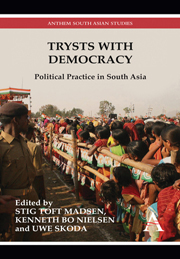About the Editors
Published online by Cambridge University Press: 05 March 2012
Summary
Stig Toft Madsen is a Danish South Asianist affiliated with the Nordic Institute of Asian Studies (NIAS). His interests range from Udupi catering and hoteliering in Goa and Gokarn to the relation between foreign jihadi guests and tribal hosts in Pakistan. His recent publications include ‘The Political Culture of Factionalism among Hindu Nationalists in Denmark’ (Critical Asian Studies 41 [2], 2009: 255–80, co-authored with Kenneth Bo Nielsen); and ‘EU-India Relations: An Expanded Interpretive Framework’, published in The Role of the European Union in Asia (Ashgate 2009). In his article ‘Being On and Being In: Exposure and Influence of Academic Experts in Contemporary Denmark’, forthcoming in Cultural Expertise and Litigation: Patterns, Conflicts, Narratives (Routledge), Madsen draws on his experience as a media commentator to discuss the role of the academic expert.
Kenneth Bo Nielsen is research fellow at the Centre for Development and the Environment, University of Oslo. An anthropologist by training, Nielsen has written on the Hindu diaspora in Denmark and on rural social movements in West Bengal, India. Recent publications include ‘Four Narratives of a Social Movement in West Bengal’ (South Asia 32 [3], 2009: 448–68); ‘Farmers’ Use of the Courts in an Anti-Land Acquisition Movement in India's West Bengal’ (Journal of Legal Pluralism 59, 2009: 121–44) and ‘Contesting India's Development? Industrialisation, Land Acquisition and Protest in West Bengal’ (Forum for Development Studies 37 [2], 2010: 145–70).
- Type
- Chapter
- Information
- Trysts with DemocracyPolitical Practice in South Asia, pp. 297 - 298Publisher: Anthem PressPrint publication year: 2011



